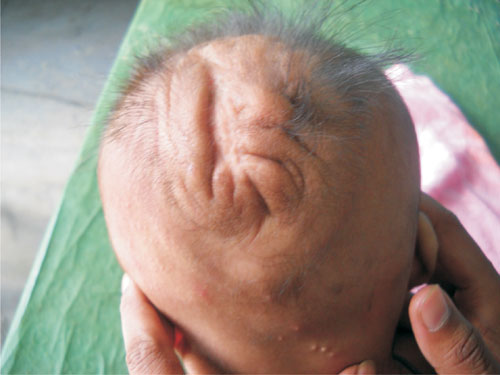|
|
|
Indian Pediatr 2011;48: 747 |
 |
Cutis Verticis Gyrata |
|
K Nayek, A Banerjee and S Pati
From Department of Pediatrics, Burdwan Medical College,
Burdwan West Bengal.
Email: [email protected]
|
|
A female infant, born of non-consanguineous marriage, presented with edema
of hands and feet and loose folds of skin on the vault of skull which her
parents noticed from birth. The baby was a term normal delivery. Her birth
and developmental history was otherwise uneventful. On head to foot
examination, the baby presented with 6-8 loose puckered folds of skin,
extending from anterior to posterior in the saggital plane, spanning the
vertex and occipital region. The folds were spongy, non tender with
overlying hair being sparse. Besides, she had loose folds of skin at the
nape of her neck and non-pitting edema of her hands and feet. G-Band
karyotype revealed 45 XO. Cutis Verticis Gyrata (CVG) is a rare entity
with an estimated prevalence of 1 in 100,000 with an estimated male to
female ratio of 6:1. CVG exists in primary and secondary forms. Primary
forms exist in primary essential (in which no other abnormality is found)
and primary non essential (that can be associated with cerebral palsy,
epilepsy, and cranial or ophthalmologic abnormality. Secondary forms are
associated with pachydermatosis, melanocytic nevi, dermatofibroma and some
syndromic associations like Noonan syndrome, Turner syndrome and many
more. In our case, the baby had Turner syndrome, as evident by the
karyotyping report. Hence this was a secondary cause of CVG. The close
differentials are acromegaly, cutis laxa (elastolysis), cylindroma, and
pachydermo-periostosis. The course of the disease, in majority of cases is
benign except in primary cases caused due to cerebriform melanocytic
naevus, close follow-up is required to detect early malignant
transformation. Treatment includes maintenance of optimum hygiene of the
skin folds and surgical correction of these folds by laser.
 |
|
Fig.1 Cutis Verticis Gyrata. |
|
|
|
 |
|

